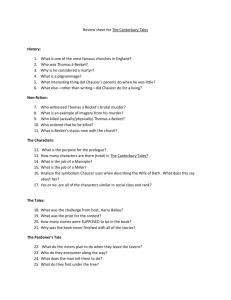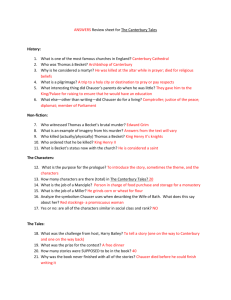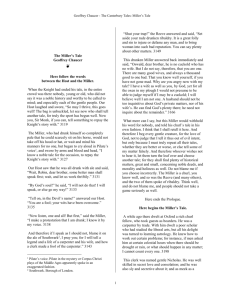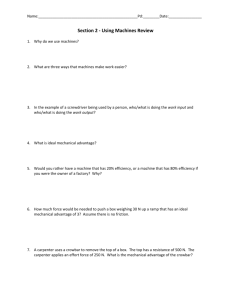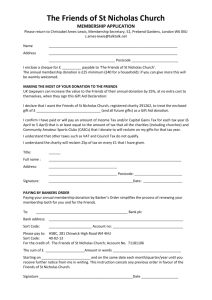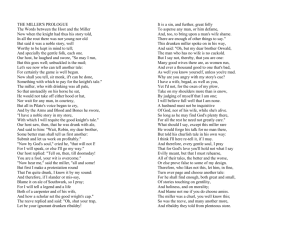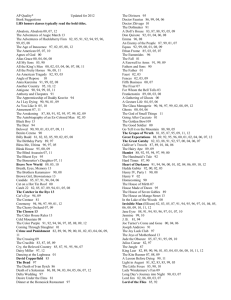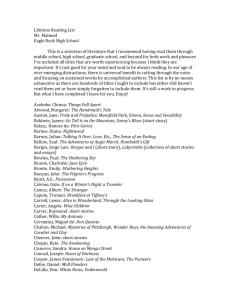The Miller`s Tale
advertisement
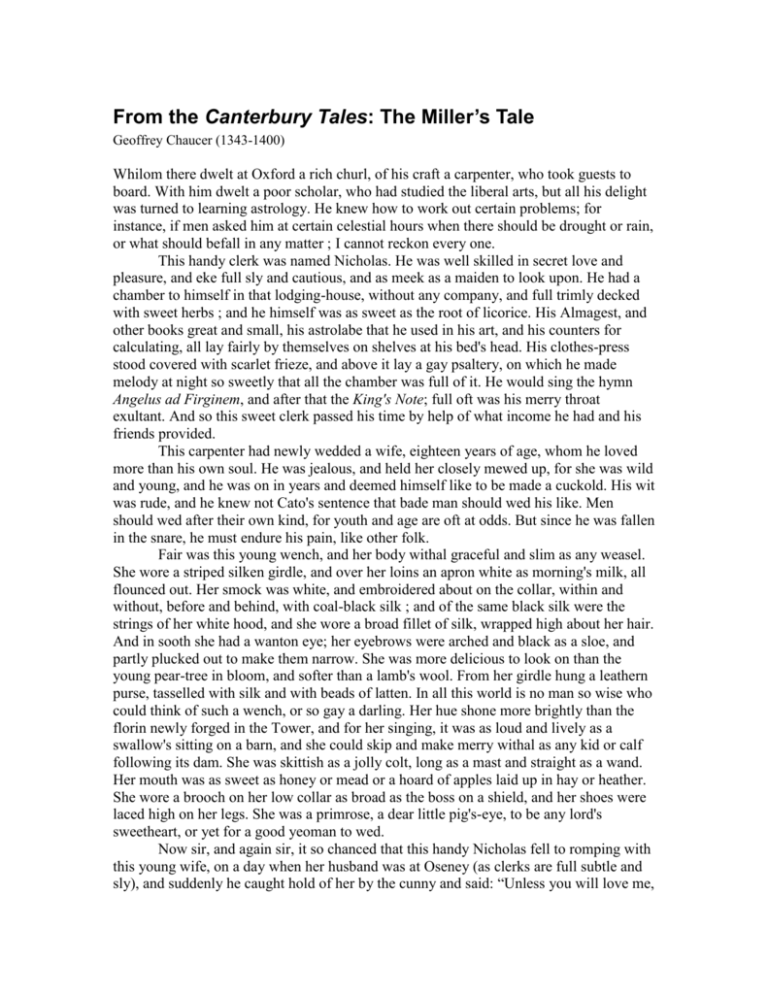
From the Canterbury Tales: The Miller’s Tale Geoffrey Chaucer (1343-1400) Whilom there dwelt at Oxford a rich churl, of his craft a carpenter, who took guests to board. With him dwelt a poor scholar, who had studied the liberal arts, but all his delight was turned to learning astrology. He knew how to work out certain problems; for instance, if men asked him at certain celestial hours when there should be drought or rain, or what should befall in any matter ; I cannot reckon every one. This handy clerk was named Nicholas. He was well skilled in secret love and pleasure, and eke full sly and cautious, and as meek as a maiden to look upon. He had a chamber to himself in that lodging-house, without any company, and full trimly decked with sweet herbs ; and he himself was as sweet as the root of licorice. His Almagest, and other books great and small, his astrolabe that he used in his art, and his counters for calculating, all lay fairly by themselves on shelves at his bed's head. His clothes-press stood covered with scarlet frieze, and above it lay a gay psaltery, on which he made melody at night so sweetly that all the chamber was full of it. He would sing the hymn Angelus ad Firginem, and after that the King's Note; full oft was his merry throat exultant. And so this sweet clerk passed his time by help of what income he had and his friends provided. This carpenter had newly wedded a wife, eighteen years of age, whom he loved more than his own soul. He was jealous, and held her closely mewed up, for she was wild and young, and he was on in years and deemed himself like to be made a cuckold. His wit was rude, and he knew not Cato's sentence that bade man should wed his like. Men should wed after their own kind, for youth and age are oft at odds. But since he was fallen in the snare, he must endure his pain, like other folk. Fair was this young wench, and her body withal graceful and slim as any weasel. She wore a striped silken girdle, and over her loins an apron white as morning's milk, all flounced out. Her smock was white, and embroidered about on the collar, within and without, before and behind, with coal-black silk ; and of the same black silk were the strings of her white hood, and she wore a broad fillet of silk, wrapped high about her hair. And in sooth she had a wanton eye; her eyebrows were arched and black as a sloe, and partly plucked out to make them narrow. She was more delicious to look on than the young pear-tree in bloom, and softer than a lamb's wool. From her girdle hung a leathern purse, tasselled with silk and with beads of latten. In all this world is no man so wise who could think of such a wench, or so gay a darling. Her hue shone more brightly than the florin newly forged in the Tower, and for her singing, it was as loud and lively as a swallow's sitting on a barn, and she could skip and make merry withal as any kid or calf following its dam. She was skittish as a jolly colt, long as a mast and straight as a wand. Her mouth was as sweet as honey or mead or a hoard of apples laid up in hay or heather. She wore a brooch on her low collar as broad as the boss on a shield, and her shoes were laced high on her legs. She was a primrose, a dear little pig's-eye, to be any lord's sweetheart, or yet for a good yeoman to wed. Now sir, and again sir, it so chanced that this handy Nicholas fell to romping with this young wife, on a day when her husband was at Oseney (as clerks are full subtle and sly), and suddenly he caught hold of her by the cunny and said: “Unless you will love me, 2 sweet-heart, truly I shall die for hidden love of you. Deary, love me now, or I will die, so God save me !” And he held her hard by the haunch-bones. She sprang back like a colt in the halter, and wriggled away with her head. “I will not kiss you, in faith,” quoth she. “Why! let be, let be, Nicholas, or I will cry out ‘Alas! Help!’ Take away your hands, of your courtesy!” But this Nicholas began to beg for her grace, and spoke so fair and made such offers that at last she granted him her love, and swore by St. Thomas of Kent that she would do his will when she should see her chance. “My husband is so jealous that unless you are privy and watch your time, I know right well I am no better than dead. You must be full sly in this thing.” “Nay, have no fear therefore,” quoth Nicholas. “A clerk had ill spent his time unless he could beguile a carpenter!” And thus they were accorded and pledged to watch for a time, as I have told. When Nicholas had done thus, petted her well and kissed her sweetly, he took his psaltery and made melody and played long and loud. Then it befell on an holy day that this goodwife betook her to the parish-church to work Christ's own works. Her forehead shone as bright as day, so had she scrubbed it when she had finished her tasks. Now at that church there was a parish-clerk named Absalom. Curly was his hair, and shone like gold, and spread out like a large broad fan; its neat parting ran straight and even, his cheeks were rosy and his eyes as gray as goosequills. His leathern shoes were of openwork, like a window in Paul's Church. He went clad full trimly and neatly all in red hosen and a kirtle of a light watchet-blue ; full fair and thick were the laces set in, and over it he had a gay surplice, as white as blossom on twig. God bless me, but he was a sweet lad! Well he knew how to clip and shave and let blood, and make a quittance or a charter for land. He could trip and dance in twenty ways after the manner of Oxford in that day, and cast with his legs to and fro, and play songs on a small fiddle. He could play on his gittern as well, and sometimes sang in a loud treble. In all the town was no brewhouse or tavern that he visited not in his merrymaking. But sooth to say he was somewhat dainty, and bashful of his speech. This Absalom, so pretty and fine, went on this holy day with a censer, diligently incensing the goodwives of the parish, and many a killing look he cast on them. And chiefest on this carpenter's wife ; to look on her seemed to him a sweet employment, she was so neat and sweet and bewitching. I dare be bound, if she had been a mouse and he a cat, he would have caught her straightway. And this sweet parish-clerk had such a lovelonging in his heart that at the offertory he would take naught from any wife ; for courtesy, he said, he would take none. That night the moon shone full fair, and Absalom thought to wake all night for love's sake; he took his gittern and went forth, amorous and gay, till he came to the carpenter's house a little after the cocks had crowed, and drew him up by a casementwindow. Dear lady, if your will so be, I pray you that you pity me! This carpenter woke, heard his song and said anon to his wife, “What, Alison! Hear you not Absalom chanting thus under our own bower-wall?” “Yes, God wot, John,” she answered him, “I hear it every bit.” 3 Thus it went on; what would you have better than well-enough? From day to day this sportive Absalom wooed her till he was all woe-begone. He woke all night and all day, he combed his spreading locks and made him fine, he wooed her by go-betweens and agents, and swore he would be her own page; he sang quavering like a nightingale ; he sent her mead, and wines sweetened and spiced, and wafers piping hot from the coals, and because she was a town-wench he proffered her money. For some folk will be won by rich gifts, and some by blows, and some by courtesy. One time he played Herod on a high scaffold, to show his nimbleness and skill. But in such a case what could avail him ? She so loved gentle Nicholas that Absalom may go blow the buck's-horn. For all his labor he had but a flout, and thus she made Absalom her ape and turned all his earnest to a jest. Men say this proverb, which is full sooth, “Ever the nigh sly one maketh the far lief one to be a loathed one.” For though Absalom go mad for it, because he was far from her eye this nigh Nicholas stood in his light. Now bear you well, gentle Nicholas, for Absalom is fain to wail and sing “Alack!” And so befell one Saturday that the carpenter was gone to Oseney, and gentle Nicholas and Alison were agreed upon this, that Nicholas shall find a fetch to beguile this poor jealous husband; and if so be the game went aright, she should be his, for this was his desire and hers also. And anon, without more words, Nicholas would delay no longer, but had meat and drink for a day or two carried softly into his chamber, and bade her say to her husband, if he asked after him, that she knew not where he was; that she had not set eyes upon him all that day; she trowed he was in some malady, for not by any crying but could her maid rouse him; he would not answer at all, for nothing. Thus passed forth all that Saturday ; Nicholas lay still in his chamber, and ate and slept or did what he would, till Sunday toward sundown. This simple carpenter had great marvel about Nicholas, what could ail him. “By Saint Thomas,' he said, “I am afeared it stands not aright with Nicholas. God forbid that he has died suddenly ! This world nowadays is full ticklish, of a truth ; to-day I saw a corse borne to church that I saw at work last Monday. Go up, call at his door,” he said to his boy, “or knock with a stone; look how it is, and tell me straight.” This boy went up full sturdily, stood at the chamber-door and cried and knocked like mad : “What ! how ! what do you, master Nick? How can you sleep all day long?” But all was for naught, he heard not a word. Then he found a hole, low down in the wall, where the cat was wont to creep in; and through that he looked in far and at last caught sight of him. This Nicholas sat ever gaping upward as if he were peering at the new moon. Down went the boy, and told his master in what plight he saw this man. This carpenter began to cross himself and said, “Help us, Saint Frideswide ! A man knows little what shall befall him! This man with his astromy is fallen into some madness or some fit; I thought how it should end this way. Men were not intended to know God's secrets. Yea, happy is a man that never had schooling, that knows naught but only his I believe! So fared another clerk with his astronomy; he walked in the fields to peer upon the stars, to see what was to happen, till he fell into a marl-pit that he saw not! But yet, by Saint Thomas, I am right sorry about gentle Nicholas. By Jesu, King of heaven, he shall be chidden for his studying if I live. Get me a staff, Robin, that I may pry under the door whilst you heave it up. I trow we shall rouse him from his studying!” And so he betook him to the chamber-door. His boy was a strong lad, and anon heaved the door up by the hasp, and in upon the floor it fell straightway. This Nicholas 4 sat ever as still as a stone, ever gaping into the air. This carpenter weened he were fallen into a desperation, and seized him mightily by the shoulders and shook him hard and cried wildly, “What, Nick! what, how! what, look down! Awake, think on Christ's passion; I cross thee from elves and spooks!” And thereupon he said the night-spell, toward the four corners of the house and without on the threshold of the door : — Jesu Christ and sweet Saint Benedight Bless this house from every wicked sprite. For the night-hag, the white pater noster; Where wentest thou, Saint Peter's sister? At last this gentle Nicholas began to sigh sore, and said, “Alack! shall all the world be destroyed again now?” “What say?” quoth the carpenter. “What now! Think on God, as we do, men that work.” “Fetch me drink,' quoth Nicholas, “and after I will speak privily of a certain thing which touches you and me both. I will tell it to no other man, be sure.” This carpenter went down and came again bringing a large quart of mighty ale; and when each of them had drunk his share, Nicholas shut his door fast and set the carpenter down beside him. “John, my dear host,” he said, “you shall swear me here on your troth that you will reveal this secret to no wight; for it is Christ's own secret that I show you, and if you tell it to any you are a lost man. For this vengeance you will receive therefore if you etray me, that you shall run mad!” “Nay, Christ and His holy blood forbid!” quoth this simple man. “I am no blabber, and though I say it myself, I am not wont to prate. Say what you will, I shall never utter it to man, woman or child, by Him that harrowed hell! “Now, John, I will not deceive you,” quoth Nicholas; “I have found by mine astrology, as I have been looking in the shining moon, that now a' Monday next, about a quarter through the night, there shall fall a rain so wild and mad that never was Noah's flood half so great. This world shall all be drowned in less than an hour, so hideous shall be the downpour. Thus shall all mankind perish in the flood.” “Alas, my wife! And shall she drown?” this carpenter answered, and well nigh fell over for sorrow. “Alas mine Alison! Is there no remedy?” “Why yes, 'fore God, if you will work after wise counsel,” quoth handy Nicholas; “but you may not work out of your own head. For thus says Solomon, and he was right trustworthy, ‘Work all by counsel, and thou shall never repent.’ And if you will work after good advice, I undertake without mast or sail to save both her and you and me. Have you not heard how Noah was saved, when our Lord had warned him that all the world should be destroyed with water?” “Yes,” quoth the carpenter, “I heard it long, long ago.” “Have you not heard also,' quoth Nicholas, “the woe that Noah and his sons had ere he could get his wife aboard? He had rather than all his black rams then, I dare be bound, that she had had a ship all to herself! Know you then what is best to do ? This thing calls for haste, and on an urgent matter men may not preach or delay. Go anon and get us forthwith into this house a kneading-trough or else a brewing-tub for each of us (but look that they be big), in which we may swim as in a barge and have therein victual enough for a day, — there needs no more. The water shall slacken and run off about 5 prime on the next day. But Robin your boy must not know of this, nor I cannot save your maid Jill ; ask not why, for though you ask me I will not tell God's secret. It ought to suffice you, if your wits be not turning, to have as great grace as Noah had. Your wife I shall save, I promise you. Go your way now, and make haste. But when you have got these three kneading-tubs for us three, then you shall hang them from the rafters high in the roof, that no man spy upon our device. And when you have done thus, and laid our victual in them full fairly, and eke an axe to smite the cord in two when the water comes, and when you have broken a hole on high in the gable toward the garden over the barn, that we may freely go on our way when the great shower is past, — then you will float as merrily, I will be bound, as the white duck after her drake. Then will I call out, ‘How, Alison! How, John ! Be merry; the flood will soon pass.’ And you will answer, ‘Hail, Master Nick ! Good morrow, I see you well, it is daylight now!’ And then we shall be lords over all the world till we die, even as Noah and his wife! “But one thing I warn you of strictly. Be well avised on that night when we be entered aboard ship that none of us speaks a word, nor calls nor cries, but we must be in our prayers. For that is God's own precious command. And your wife and you must hang far apart, that there be no folly betwixt you, any more in looking than in act. Now all this device is told you; go, and God speed you ! To-morrow at night, when folks are all abed, we will creep into our kneading-tubs and sit there, awaiting God's grace. Go your way now, I have no time to make longer sermoning of this. Men say thus : ‘Send the wise and say nothing.’ You are so wise it needs not teach you. Go, save our lives, I entreat.” This simple carpenter went his way with full many an “alack!” and “alas!” and told the secret to his wife. And she was wary, and knew better than he what all this quaint device was about. But nevertheless she fared as if she should die, and said, “Alas! go your way at once and help us to escape, else we are all lost ; I am your true, faithful wedded wife. Go, dear spouse, and help to save us!” Lo, how great a thing is feeling! Men may die of imagination, so deep may the impression be. This simple fellow began to quake ; he thought verily he could hear Noah's flood come wallowing like the sea to drown Alison his honey sweeting; he wept, wailed and made sorry cheer, and sighed with many a sorry gust. He went and got him a kneading-trough, and after that a tub and a cask, sent them privily to his house and hung them in the roof. With his own hand he made three ladders, to climb by the rungs and uprights into the tubs hanging amongst the beams ; and victualed tub and trough and cask with bread and cheese, and good ale in a great vessel, right sufficient for a day. But ere he had made all this gear, he sent his boy and eke his wench to London about his business. And as it drew toward night on the Monday, he lit no candle, but shut the door and ordered all things as they should be ; and, in brief, up they all three climbed, and sat still whilst a man could walk a furlong. “Now mum, and say a pater noster!” said Nick; and “Mum!” quoth John, and “Mum!” Alison. This carpenter sat still and said his prayers, ever listening for the rain, if he could hear it. The dead sleep, for very weariness and apprehension, fell on this carpenter even about curfew-time or a little later, as I suppose; he groaned sorely in the travail of his spirit, and eke snored, for his head lay uneasily. Down the ladder stalked Nicholas, and Alison sped down full softly; without any further words they went to bed, where the 6 carpenter was accustomed to lying. There was the revelry and the melody, and thus lay Alison and Nicholas, busy in mirth and pleasure, till the bells began to sound for lauds, and friars in the chancel began to sing. This parish-clerk, amorous Absalom, always so woebegone for love, was at Oseney upon that Monday to divert him and make merry, with a party ; and by chance he privily asked a cloister-monk after John the carpenter. The monk drew him aside out of the church. “I wot not,” he said; “I have not seen him work here since Saturday; I trow he be gone where our abbot has sent him for timber. For he is wont to go for timber and remain at the grange a day or two. Or else he is at home, certainly. In sooth I cannot say where he is." This Absalom waxed full merry of heart, and thought, “Now is the time to wake all night, for certainly since daybreak I have not seen him stirring about his door. On my soul, at cockcrow I shall knock full privily at his casement which stands low upon his chamber-wall. To Alison now will I tell the whole of my love-longing, and now I shall not fail at the least to have a kiss from her. I shall have some sort of comfort, in faith. My mouth has itched all day long; that is a sign of kissing at least. All night eke I dreamed I was at a festival. Therefore I will go sleep an hour or two, and then I will wake all night in mirth.” When the first cock had crowed, up rose this frisky lover, and arrayed him in his gayest with all nicety. But first he chewed cardamoms and licorice to smell sweetly, ere he had combed his hair, and put a true-love charm under his tongue, for thereby he hoped to find favor. He rambled to the carpenter's house, and stood still under the casement, which was so low it reached to his breast. He gave a soft half-cough, — “What do you, sweet Alison, honeycomb ? My fair bird, my darling! Awake, sweet cinnamon, and speak to me. You think right little upon my sorrow, who sweat for your love wherever I go! No wonder though I languish and sweat ! I mourn like a lamb after the dug. In faith, darling, I have such love-longing that I mourn like the true turtle-dove. I cannot eat, no more than a maiden.” “Go from the window, Jack-fool,' quoth she. “On my soul, there will be no singing ‘Come buss me now.’ I love another better than you, by heaven, Absalom, and else I were at fault. Go your ways, or I will cast a stone at you, and let me sleep, in the Devil's name!” “Alas!” quoth he. “Alackaday that true love was ever so ill bestowed! Then kiss me, since it may be no better, For the love of Jesu, and for the love of me.” “Will you then go your way?” quoth she. “Ye, certes, sweetheart,” quoth this Absalom. “Then make yourself ready,” quoth she; “I come anon.” And unto Nicholas she said privately, “Now hush, and you will laugh your fill.” This Absalom set himself down on his knees and said, “I am a lord at your service; and after this I hope there will come more. Sweetheart, your grace, sweet bird— mercy!” The window she undid, and that in all haste. “Hurry up,” quoth she, “come on, and be quick about it, lest our neighbors see you.” This Absalom began to wipe his mouth dry. The night was dark as pitch or coal; out the window she put her hole. And Absalom—he knew no better or worse, but kissed 7 her naked ass full savorly, before he was aware of this. Aback he started, and thought something was amiss; For well he knew a woman has no beard. He felt a thing all rough and long haired, And said, “Fie! Alas! What have I done?” “Tee hee,” quoth she, and clapped the window shut, and Absalom went forth at a sorry pace. “A beard! A beard!” quoth handy Nicholas, “By God’s body, this goes fair and well!” Poor Absalom heard, this, every word, and he began to bite his lips for anger, and he said to himself, “I shall pay you back!” Who rubs his lips now, who chafes his lips with dust, sand, straw, cloth, chips, but Absalom, who cries full often, “Alas!” “The devil take my soul,” said he, “but I’d rather be avenged for this insult than anything else in this town! Alas,” he said, “alas that I was ever turned away!” His hot love was cold and all quenched; for from the time that he kissed her ass, he set not a cress for paramours, for he was well healed of that malady. Full often he cursed women, and he wept like a child who has been beaten. This Absalom walked slowly across the street to a smith men called Master Gervase, who smithied plough-instruments at his forge. He was busily sharpening coulter and share when Absalom knocked full gently and said, “Undo, Gervase, and that anon.” “What! Who are you ?” “It is me, Absalom.” “What, Absalom ! By the rood, why rise ye so early ? — Eh, benediciti! What ails you? Some gay girl, God wot, has brought you so early astir. By Saint Neot, you wot well what I mean!” This Absalom recked not a peascod for all his mocking, and returned not a word in kind. He had more tow on his distaff than Gervase knew, and said, “Dear friend, that hot coulter in the chimney — lend it me, I have somewhat to do with it; and I will bring it you straightway again.” “Certes,” answered Gervase, “were it gold or nobles in a poke all uncounted, you should have it, as I am a faithful smith ! Eh, the Devil, what will ye do with it?” “That is as it may be,” quoth Absalom. “I shall tell you to-morrow-day”; and he caught the coulter by the cool handle. Full softly he stole out at the door and went to the wall of the carpenter's house. He coughed first, and knocked withal upon the window, as he did before. “Who is there that knocks so?” Alison answered. “I warrant it a thief!” “Why nay,” quoth he, “God wot, my sweeting, I am your Absalom, my sweetheart. I have brought you a ring of gold; my mother gave it me, on my life! It is full fine and well graven withal. This I will give you if you kiss me!” This Nicholas thought he would amend all the sport ; he should kiss him ere he escaped ! Back he put the window in haste, and out he put himself. Thereupon spoke this clerk Absalom, “Speak, sweet bird, I wot not where thou art.” This Nicholas anon let fly a fart as great as a thunderbolt, so that he was almost blinded by the stroke of it; but he was ready with his hot iron, and smote Nicholas therewith amid the ass. Off went the skin a hand-breadth about, the hot coulter so 8 burned him, and for the pain he thought he should die. “Help! Water, water ! Help, help, for God's sake !” he cried like one mad. The carpenter started out of his slumber; he heard one cry wildly “Water!”, and thought, “Alas! Now comes Noah's flood!” He sat up without a word, and with his axe smote the cord a-two, and down went tub and all; they stopped for nothing till they came to the floor, and there he lay in a swoon. Up started Alison and Nick, and cried “Help!” and “Alack!” in the street. The neighbors young and old ran to stare upon him as he lay yet in a swoon, for with the fall he had broken his arm. But he must even digest his own trouble, for when he spoke he was overborne by Alison and gentle Nicholas. They told every man he was mad, he was aghast so of “Nowell's flood” in his fantasy, that of his folly he had bought him three kneading-tubs and had hung them above in the roof; and had prayed them for God's sake to sit with him in the roof, par compagnie. Folks laughed at his odd quirk; into the roof they peered and gaped, and turned all his trouble into mirth. For whatsoever the carpenter answered, it was all for naught; no man heard his speeches, he was so sworn down by the great oaths of the others that in all the city he was held as mad. Every clerk anon held with every other clerk : “The man is mad, my dear brother!” And every wight laughed over this contention. Thus the carpenter’s wife got screwed, for all his watching and jealousy, and Absalom kissed her nether eye, and Nicholas was burned in the tooter. This tale is done, and God save all the company! Here endeth the Miller his Tale. 9
